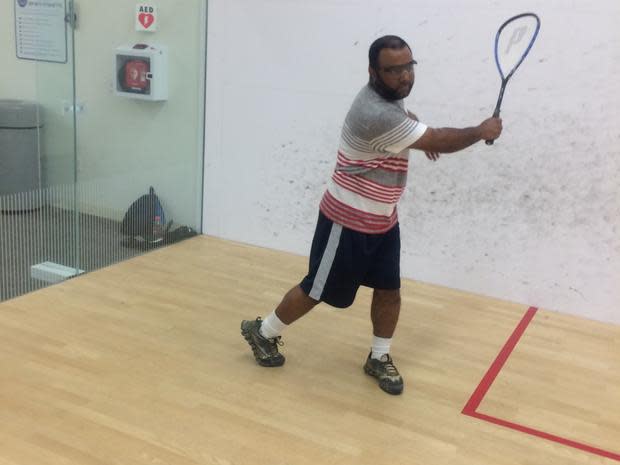Mohammad Sabah: Data chief. Product builder. Cricketer.

Mohammad Sabah playing squash at a fitness club.
Image: Workday
Mohammad Sabah has always been interested in software development, but it wasn't until he got one of his first jobs out of college that he became fascinated by what he could do with data.
"One of the first things that really struck me was -- you can actually start learning from historical behavior and start recommending better products," Sabah said.
Sabah is the head of data science at Workday, where he leads the company's initiatives in big data and machine learning. He started working at Workday almost a year ago, but his work in data science extends back through more than a decade.
The term "big data" has evolved over the years. It's not just the scale of the data anymore, but a plethora of other aspects that make big data its own thing. Now that we have the technology and infrastructure to process this data at scale, he said, big data's definition is becoming a little more concrete.
Sure, people want to process this data, but they also want to make it work, using the data to drive key insights and to help them make decisions about the business.
According to Sabah, business intelligence and predictive/prescriptive analytics will become the centerpieces that are driving IT decision-making in the future.
"The biggest shift that we have seen, since the cloud revolution a few years ago, has been the shift toward recommendations," Sabah.
The rise in big data also means the rise in new job opportunities for budding computer scientists. To succeed as a data scientist, Sabah said that you need the basics of an interest in computer science and statistics, but you also need to have a feel for the business side of things.
This is why it helps to have product experience. Even now, Sabah writes codes that goes into production. He said that it is critical to be able to quickly build a product and push it.
"You don't want to come up with the best approach, you want to come up with the best approach as of that moment and you want to keep iterating on it," he said.
You don't want to go into a cave and come back after six months working on the same algorithm. That's not how it works. You have to do it quickly and keep polishing it, he said.
After receiving his master's degree in computer science from Virginia Polytechnic Institute and State University, Sabah did a brief stint at Verizon before he went to work for Yahoo in 2004.
It was at Yahoo that he became interested in machine learning and data science through his work improving search relevance and computational advertising. It was also at Yahoo where he was exposed to big data through Hadoop and Hadoop products.
He then worked for what was then called the Fox Audience Network, which worked with brands such as MySpace, The Wall Street Journal, IGN, and Rotten Tomatoes where he continued working on computational advertising.
In taking a break from advertising, Sabah took a job with Netflix, where he worked on improving recommendations and search. So, if you've gotten any really good movie recommendation via Netflix lately, he's partly to thank.
In 2012, Sabah started at Facebook. Here he worked on the Timeline ranking algorithm, privacy and tagging tools, and metrics for profile completeness.
He was then recruited by Adeyemi "Ade" Ajao to be the chief scientist at Identified, a startup working on recruiting software, where he used NLP and machine learning to help build out the product. Identified was acquired by Workday in 2013 and Sabah continued to work for them.
A big part of Sabah's professional passion is making products that provide actionable insight from the big data gleaned by other tools. Most recently, he's been working on Workday Insight Applications, an app suite that helps users answer questions and make decisions with the power of machine learning and big data analysis. One of the questions they are trying to answer with the app suite is: "Why are top performers leaving," and what users can do to increase talent retention.
In his own words...
What do you do to unplug?
"I'm a big sports lover. I really like playing squash. So that, I think, is the sport I go to when I have time. Beyond that, I also play cricket for a local team, for a league here in the Bay Area. Those are the two big sports for me, I play cricket almost every weekend. Beyond that, it's my family -- I spend time with my family. I have two kids, five and three, so I play with them."
If you weren't working in tech, what other profession would you love to try?
"When I was young I used to want to be a professional cricketer, before I got into data science and before I got into my undergrad. At some point, that was my passion. It still is, but right now I would say that's number two in terms of sports and squash is the number one for me."
What is one interesting fact about you the only a few people know?
"I've always been interested in learning more about religion and so on. So, I've done a good study on comparing religions over the last seven to eight years. That is something that not a lot of people know about me, but that's one interest that I have -- study different religions and understand where they are coming from and where they diverged and things like that."

